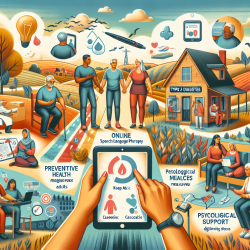Introduction
The COVID-19 pandemic has been a catalyst for change in education systems worldwide. South Korea, one of the earliest countries affected by the pandemic, offers a compelling case study in adapting early childhood education and care (ECEC) policies to meet unprecedented challenges. A recent mixed-methods study titled A Mixed-Methods Study of Early Childhood Education and Care in South Korea: Policies and Practices During COVID-19 provides insights into how South Korea navigated these turbulent times. This blog will explore key findings from the study and offer practical strategies for educators and policymakers to enhance their practice and prepare for future challenges.
Key Findings from the Study
The study utilized the Whole Child approach to evaluate South Korea's ECEC policies and practices during the first six months of the pandemic. This approach emphasizes the importance of a safe, supportive, and engaging learning environment for children's holistic development. The research identified several key areas of focus:
- Safe and Supported Environments: South Korea's policies prioritized creating safe and supportive environments for children. This included postponing school openings, implementing strict sanitation protocols, and providing financial support to families.
- Health and Well-being: The government issued guidelines for health education and psychological support, recognizing the importance of addressing both physical and mental health needs.
- Engagement and Learning Continuity: The transition to online learning was supported through government resources and platforms, although challenges in maintaining engagement and providing a comprehensive curriculum were noted.
- Challenges in Implementation: Despite comprehensive policies, discrepancies existed between government guidelines and the realities faced by educators, highlighting the need for more tailored support and resources.
Practical Strategies for Educators
Based on the study's findings, educators can adopt several strategies to enhance their practice and prepare for future disruptions:
- Adopt a Whole Child Approach: Focus on creating a learning environment that supports children's physical, emotional, and social well-being. This holistic approach can help mitigate the impacts of disruptions and promote resilience.
- Leverage Technology: Utilize online platforms and resources to maintain learning continuity. Encourage interactive and engaging activities that foster critical thinking and problem-solving skills.
- Strengthen Family Partnerships: Collaborate with families to support children's learning and well-being. Regular communication and feedback can help address individual needs and enhance learning outcomes.
- Advocate for Policy Support: Engage with policymakers to ensure that educational policies are responsive to the needs of educators and students. Advocate for resources and support that address the unique challenges of early childhood education.
Encouraging Further Research
While the study provides valuable insights, it also highlights the need for ongoing research to understand the long-term impacts of the pandemic on early childhood education. Practitioners are encouraged to contribute to this body of knowledge by conducting research in their own contexts and sharing their findings with the broader educational community.
Conclusion
South Korea's experience during the COVID-19 pandemic underscores the importance of adaptability and resilience in education systems. By adopting a Whole Child approach and leveraging technology and family partnerships, educators can better support children's development and learning in times of crisis. As we continue to navigate the challenges posed by the pandemic, let us draw inspiration from South Korea's example and work towards a more inclusive and supportive educational landscape.
To read the original research paper, please follow this link: A Mixed-Methods Study of Early Childhood Education and Care in South Korea: Policies and Practices During COVID-19.










